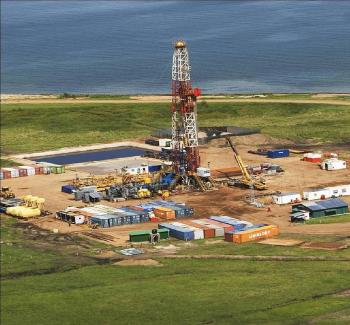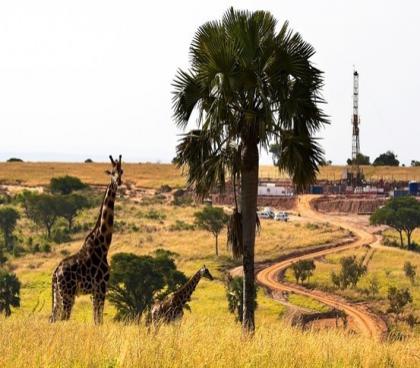New Report, New Consciousness
This July, in partnership with Gaia, the National Association of Professional Environmentalists (NAPE) released a landmark reportchallenging the Ugandan Government’s plans to allow large-scale oil extraction in the country’s Albertine Region- home to both a great wealth of biodiversity, and an estimated 3.5 billion barrels of oil and gas.
Exploring the dire ecological and social threats posed by oil extraction in the region, the report calls for watersheds, food sovereignty areas and Sacred Natural Sites and Territories (SNST) in Uganda to be protected, and declared as No Go Areas for mining and extractive activities. Critically, it recognises that, due to the interconnected nature of ecosystems, the negative impacts of mining will spread far beyond mining sites throughout Uganda, and potentially into neighbouring countries- the Democratic Republic of Congo, Rwanda and South Sudan- that share the Lake Albert watershed.
Since its launch, the report has received considerable media attention in Uganda, as controversy over Government plans to exploit oil reserves builds. Coverage of the report, its proponents and messages, has appeared in both local and national newspapers as well as featuring as a news report on two national television channels. Awareness of the report has also spread internationally, with NAPE recently presenting its findings to both the IUCN and the United Nations.
Providing both a clear call to action for the powers that be to recognise No Go Areas, and vital advocacy and legal advice for affected communities, the report is a timely advocacy tool for resisting mining in Uganda.
Emerging Threat to Lake Albert
Of particular concern to the report, NAPE and local communities in Uganda’s ‘oil region’, is the potential impact of oil extraction near Lake Albert— one of Africa’s Great Lakes– the surrounding watershed and SNST in the area. The Lake and its main waterways, the Semliki, Victoria Nile and Albert Nile rivers, play a vital role in fishing livelihoods and local agriculture as sources of clean, fresh water. Whilst SNST are critical areas for maintaining the balance of local ecosystems, and the cultural cohesion and identity of local peoples.
Fears over the Lake’s future have deepened considerably this week as it emerged that the Chinese National Offshore Oil Corporation (CNOOC) could begin test drilling activities beneath Lake Albert as soon as next week (31 August).
In an article in the Daily Monitor, the Ugandan newspaper, CNOOC’s Environmental Supervisor claims that the company are ready to drill horizontally and vertically beneath Lake Albert to a depth of 2,000 metres. Situated a stones throw from the lakeshore, CNOOC’s Kingfisher Oil Reserve is expected to produce around 40,000 barrels of oil per day when in full production. The corporation has already dug waste pits in the vicinity of the Kingfisher Reserve and Lake Albert in anticipation of this.
This latest development at the Kingfisher Site may be a worrying sign of things to come elsewhere in the region.
Uganda’s multi-billion barrel onshore oil field has attracted the attention of several other multinational corporations since it was first discovered in 2006. Multinationals’ extensive exploration activities have led to the disovery of increasing amounts of commercially extractable oil in the country since that time. In 2013 CNOOC became the first overseas company to receive a production license. UK corporation Tullow Oil and French oil giant Total are also seeking to drill in the area, following a 2012 agreement with the Ugandan Government, but do not yet have production permits.
The onset of full-scale oil production is constrained at present, despite any permits granted, by the lack of an oil refinery in the region. However, with construction of a refinery in Buseruka Sub County, Hoima District set for completion in 2017, this situation is soon to change. It appears likely the refinery will be majority owned by two other foreign multinationals: either RT Resources from Russia, or SK Energy from South Korea
Given the ecological and social impacts caused by oil exploration in the region, full operations would herald a new, more drastic wave of injustice and destruction. CNOOC’s plan to begin test drilling is an ominous step towards this, and will have impacts of its own.
Growing Resistance and Solidarity
Through both the report and a short documentary, NAPE has revealed the impassioned community resistance to mining in Uganda’s ‘oil region’. Voices from the ground suggest land grabbing, the desecration of SNST and unfair compensation have all occurred as multinational companies hunt for oil- a trend repeated worldwide where extractive industries are present.
Whilst corporations vye for the right to exploit Uganda’s oil, NAPE is working stoically with these communities to resist and prevent destructive developments such as CNOOC’s at Lake Albert. Increasing awareness of the impacts of mining, and the need to protect water, food sovereignty and SNST in particular, numerous creative initiatives are being born born that empower communities and inform their resistance to mining. These include a Community Green Radio, launched with the report, that provides a forum for local people to discuss oil related issues in Hoima District, and a coalition of Sacred Site Custodians working together for the protection of SNST.
As a result of this work and their own experiences, many communities are now standing up to protect their ecosystems and the livelihoods that depend on them. Unswayed by the usual promises of compensation, short-term jobs and prosperity, they are saying a resounding No to mining.
The recently published NAPE-Gaia report is another vital advocacy tool in the service of grass-roots movement building. It recommends Ugandan laws that could be used to assert communities’ rights and responsibilities to say No to mining. Perhaps even more importantly, it advocates for the use of ‘unwritten law’, or Earth Law. Stemming from communities’ customary governance systems this jurisprudence requires human thinking and activities to respect and align with Earth’s laws, limits and the inherent rights of ecosystems.
In the case of Lake Albert, the ‘unwritten’ law of the Earth asserts that the lake, SNST and all of the ecosystems it connects with, have inalienable rights that must berespected: The right to exist, the right to habitat and to play their role in the unfolding, life-giving processes of evolution. These in turn express Lake Albert’s right to remain unpolluted and undamaged by mining. Unwritten law also acknowledges that our human rights to clean water, human and ecological health all depend on the rights of the ecosystems we rely on for these gifts.
NAPE is now dialoguing with communities to decide what action to take to stop the onset of mining activities on Lake Albert at CNOOC’s Kingfisher site. Standing with them is a broad Ugandan coalition of civil society organisations, academics, traditional institutions, lawyers and policy makers, brought together by NAPE. Supporting them in turn is a growing network of African and international coalitions and organisations taking a bold stand: saying Yes to Life, No to Mining.
The fight to keep the oil in the soil continues.



